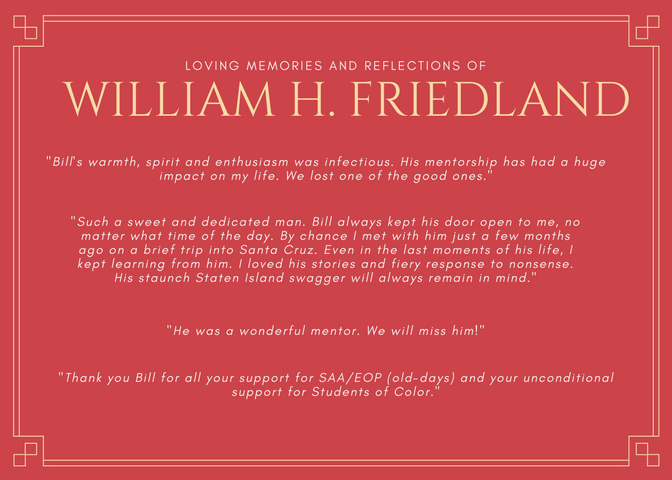It is with profound sadness that the Community Studies Program announces the passing of its founder, Emeritus Professor WIlliam H. Friedland, on Tuesday, February 20, 2018.
Bill was everything to Community Studies: founding visionary of experiential education for social justice; audacious scholar of international agro-food systems, staunch advocate that the University of California serve the needs of all the state's peoples regardless of their rank or race. Bill's campus legacies are numerous and his intellectual impacts are immense. It was Bill's leadership while Dean of Social Sciences, for example, that created what is today's Rachel Carson College. He pioneered the commodity chain approach to agro-food systems which revolutionized the field. He continued to publish and garner awards well into his retirement from teaching. He will forever remain a central figure in UCSC's history.
As important as scholarship was to Bill's identity, he was also a loving husband and proud father of three. Community Studies is pleased to share the following message from them.
William (Bill) Herbert Friedland spent almost every day of his 49 years in Santa Cruz engaged in what he loved: thinking about ideas, learning, teaching, and doing his part to change the world. Bill shuffled off this mortal coil on February 20, 2018.
Bill was born to Anna and Barnett Friedland, Russian Jewish immigrants, in Staten Island, New York, May 27 1923. He graduated from Curtis High School in January 1940, and subsequently studied for a single semester at Staten Island’s Wagner College.
Bill initially found little engagement in academic life. With his growing interest in the rights of the working class, Bill relocated to Detroit, Michigan, which at the time was a major, industrial, working-class city. Bill spent over a decade in Detroit, working initially on the auto assembly lines, but most importantly as a union organizer. During this period, Bill began to collect and play songs of the labor movement, and with a CIO colleague he recorded two albums: “Songs of the Wobblies” and “Ballads for Sectarians”.
Growing increasingly disenchanted with the labor movement and disgusted by Senator Joseph McCarthy’s political witch-hunts, Bill relocated to Europe expecting to make his life there. At a Thanksgiving day celebration in Paris held by some fellow expats, Bill met his future wife Joan.
Bill returned to the USA and re-entered college in 1954 at Wayne University in Michigan, finishing his Bachelors and Masters degrees in two academic years. Bill was subsequently admitted to the Berkeley Sociology graduate program in 1956. In 1958, Bill married Joan, and the two of them traveled to Tanganyika on a Ford Foundation grant where they would spend the next 16 months while Bill did field research on emerging African trade unionism for his PhD.
Upon returning to Berkeley in 1961 to write his dissertation, Bill was recruited to join the faculty at Cornell University’s School of Industrial and Labor Relations. At Cornell, he founded the Cornell Migrant Labor Project, an innovative educational experience that offered undergraduate students an opportunity to utilize field study methods typically experienced only at the graduate level. The program ultimately won research and funding support from the U.S. Department of Labor.
In 1967, while on sabbatical in California to research California agricultural labor, Bill was invited to present a colloquium at UCSC on the Cornell Migrant program. Bill was actively recruited to join UCSC during the 1967-68 period, and he began the 1969 Fall semester as the founder of Community Studies. A key focus of this new degree program was to have students do a 6 month field research project within a group or organization that was typically overlooked by the UC system. This often meant organizations that served the economically disadvantaged, racial minorities, or other powerless groups within society.
Bill’s own research program studied agricultural production and globalization, and the impact of mechanization on farmers, farm workers, and rural communities. He was a pioneer in the study of food distribution systems, and his work in this area influenced a generation of scholars.
Bill also played an important role in California and local Santa Cruz politics. His research challenged the pro-agribusiness bias in UC’s agricultural schools and forced a focus on farmworkers and small farmers. In addition to mentoring several students who became Mayors of Santa Cruz and thousands of students who went on to direct non-profits in Santa Cruz and throughout California and the U.S., his study of homelessness in Santa Cruz led to a more sympathetic approach by the City. One of Bill’s courses at UCSC led to a complete revision of the transportation system in Santa Cruz in the early 1970s.
Bill taught, researched, and published for 22 years at UCSC until his retirement in 1991 at the age of 70. Following retirement, Bill continued his intellectual pursuits and was actively engaged as a research professor well into his late 80’s. In 2012 he was named a Distinguished Rural Sociologist by the Rural Sociological Association.
Bill is survived by his wife Joan, son Liam (Uba), daughters Fiona (Steve) and Nicole (Mike), and his favorite grandson Skyler. He will be missed.
Donations may be made in Bill’s honor to a non-profit of your choice.
For now, we welcome your memories and reflections of Bill which may be sent through our facebook page.


